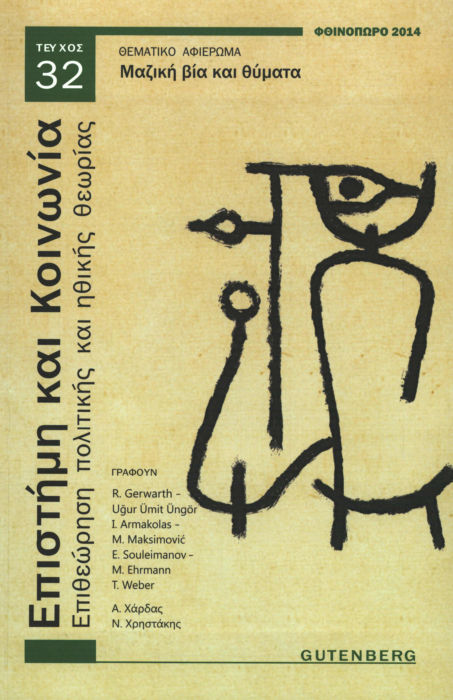Πολιτικές χρήσεις του παρελθόντος στην Ανατολική Ασία
Περίληψη
No abstract
Λεπτομέρειες άρθρου
- Πώς να δημιουργήσετε Αναφορές
-
Weber, T. (2015). Πολιτικές χρήσεις του παρελθόντος στην Ανατολική Ασία. Επιστήμη και Κοινωνία: Επιθεώρηση Πολιτικής και Ηθικής Θεωρίας, 32, 121–141. https://doi.org/10.12681/sas.566
- Ενότητα
- Άρθρα

Αυτή η εργασία είναι αδειοδοτημένη υπό το CC Αναφορά Δημιουργού – Μη Εμπορική Χρήση – Παρόμοια Διανομή 4.0.
Οι Συγγραφείς που δημοσιεύουν εργασίες τους σε αυτό το περιοδικό συμφωνούν στους παρακάτω όρους:- Οι Συγγραφείς διατηρούν τα Πνευματικά Δικαιώματα και χορηγούν στο περιοδικό το δικαίωμα της πρώτης δημοσίευσης ενώ ταυτόχρονα τα πνευματικά δικαιώματα της εργασίας προστατεύονται σύμφωνα με την άδεια Creative Commons Αναφορά Δημιουργού - Μη Εμπορική Χρήση - Παρόμοια Διανομή 4.0 Διεθνές , που επιτρέπει σε τρίτους - αποδέκτες της άδειας να χρησιμοποιούν την εργασία όχι για εμπορικούς σκοπούς, με την προϋπόθεση της διατήρησης των διατυπώσεων που προβλέπονται στην άδεια σχετικά με την αναφορά στον αρχικό δημιουργό και την αρχική δημοσίευση σε αυτό το περιοδικό και με διανομή τυχόν τροποποιήσεων υπό την ίδια άδεια όπως και το πρωτότυπο.
- Οι Συγγραφείς μπορούν να συνάπτουν ξεχωριστές, και πρόσθετες συμβάσεις και συμφωνίες για την μη αποκλειστική διανομή της εργασίας όπως δημοσιεύτηκε στο περιοδικό αυτό (π.χ. κατάθεση σε ένα ακαδημαϊκό καταθετήριο ή δημοσίευση σε ένα βιβλίο), με την προϋπόθεση της αναγνώρισης και την αναφοράς της πρώτης δημοσίευσης σε αυτό το περιοδικό.
- Το περιοδικό επιτρέπει και ενθαρρύνει τους Συγγραφείς να καταθέτουν τις εργασίες τους μέσω διαδικτύου (π.χ. σε ένα ακαδημαϊκό καταθετήριο ή στους προσωπικές τους ιστοσελίδες) πριν και μετά από τις διαδικασίες της δημοσίευσης, καθώς αυτό μπορεί να οδηγήσει σε παραγωγική ανταλλαγή ιδεών και σκέψεων καθώς επίσης και σε γρηγορότερη και μεγαλύτερη χρήση και ευρετηρίαση της δημοσιευμένης εργασίας (See The Effect of Open Access).
Λήψεις
Τα δεδομένα λήψης δεν είναι ακόμη διαθέσιμα.
Αναφορές
Askew, D. (2004). ‘New Research on the Nanjing Incident’, The Asia- Pacific Journal, http://www.japanfocus.org/-David-Askew/1729.
Assmann, J. (1992). Das kulturelle Gedächtnis. München: C.H. Beck.
Assmann, A. (2006). Der lange Schatten der Vergangenheit. München: C.H. Beck.
Brook, T. (επιμ.) (1999). Documents on the Rape of Nanking. Ann Arbor: University of Michigan Press.
Chang, I. (1997). The Rape of Nanking. The forgotten Holocaust of World War II. New York: Basic Books.
Cohen, P.A. (1997). History in Three Keys. The Boxers as Event, Experience, and Myth. New York: Columbia University Press.
Dirlik, A. (1991). “‘Past Experience, If Not Forgotten, is a Guide to the Future”; or, What Is in a Text? The Politics of History in Sino-Japanese Relations’, Boundary 2, 18, 3: 29-58.
Fogel, J. (επιμ.) (2000). The Nanjing Massacre in History and Historiography. Berkeley: University of California Press. 4
Fogel, J. (2007). ‘The Nanking Atrocity and Chinese Historical Memory’, στο B.T. Wakabayashi, επιμ., The Nanking Atrocity, 1937-38. Complicating the Picture. New York: Berghahn Books.
He, Y. (2009). The Search for Reconciliation. Sino-Japanese and German-Polish Relations since World War II. New York: Cambridge University Press.
Heisler, M.O. (2008). ‘The Political Currency of the Past: History, Memory and Identity’, The ANNALS of the American Academy of Political and Social Science, 617 1: 14-24.
Japanese Society for History Textbook Reform (επι,μ.) (2005). New History Textbook (κεφάλαια 4-5). Tokyo.
Larat, F. (2006). ‘Vergegenwärtigung von Geschichte und Interpretation der Vergangenheit: Zur Legitimation der europäischen Integration’, στο M. Schöning & S. Seidendorf, επιμ., Reichweiten der Verständigung. Intellektuellendiskurse zwischen Nation und Europa. Heidelberg: Winter.
Morris-Suzuki, T. κ.ά. (2012). East Asia Beyond the History Wars: Confronting the Ghosts of Conflict. London/New York: Rout- ledge.
Morris-Suzuki, T. (2005). The Past Within Us. London: Verso.
Münkler, H. (1994). ‘Politische Mythen und nationale Identität’, στο Wolfgang Frindte κ.ά., επιμ. Mythen der Deutschen. Deutsche Befindlichkeiten zwischen Geschichten und Geschichte. Opladen: Springer.
Renan, E. (1994). ‘Qu’ est-ce qu’ une nation? (‘What is a nation? ) [1882], στο J. Hutchinson & A.D. Smith, επιμ. Nationalism, Oxford/New York: Oxford University Press.
Rose, C. (1998). Interpreting History in Sino-Japanese Relations. A Case-Study in Political Decision Making. London/New York: Taylor & Francis.
Rose, C. (2005). Sino-Japanese Relations. Facing the Past, Looking to the Future? New York: Taylor & Francis.
Strâth, B. (2002). ‘A European Identity: To the Historical Limits of a Concept’, European Journal of Social Theory, 5 4: 387-401.
Wakabayashi, B.T. (επιμ.) (2007a). The Nanking Atrocity, 1937-38. Complicating the Picture. New York: Berghahn Books.
Wakabayashi, B.T. (2007b). ‘The Nanking 100-Man Killing Contest Debate, 1971-1975’, στο του ιδίου, επιμ. (2007). The Nanking Atrocity, 1937-38. Complicating the Picture. New York: Berghahn Books.
Weber, T. (2012). ‘Die Gegenwart der Vergangenheit in Ostasien: Das Nanking-Massaker als chinesisch-japanisches Geschichtsproblem’, Geschichte in Wissenschaft und Unterricht (GWU), 7/8: 402-419.
Winter, J. (2008). ‘Foreword: Historical Remembrance in the Twenty-First Century’, The ANNALS of the American Academy of Political and Social Science 617, 1: 6-13.
Yang, D. (1999). ‘Convergence or Divergence? Recent Historical Writings on the Rape of Nanjing’, The American Historical Review, 104, 3: 842-865.
Yoshida, T. (2006). The making of the ‘Rape of Nanking’. History and memory in Japan, China, and the United States. Oxford/ New York: Oxford University Press.
Zhang, X. (επιμ.) (2007). Nanjing datusha zhenxiang, 3 τόμ. Nanjing.



